The most beautiful Christmas markets in Spain to visit in 2025
Friday, December 12, 2025
In December, Christmas begins to make itself felt in every corner. Streets sparkle with lights, the scent of traditional sweets fills the air, and artisan stalls take over squares and promenades across Spain. For anyone who enjoys the festive atmosphere, Christmas markets are simply unmissable.
In Spain, Christmas markets offer a perfect combination of tradition, culture and local life. From historic squares to illuminated promenades, each market reflects a different way of celebrating.
We have selected 10 of the most beautiful Christmas markets in Spain, ideal for those who want to immerse themselves in the Christmas spirit, explore new cities or enjoy a festive experience.

Christmas markets offer a perfect blend of tradition, culture and local life. Photo: GettyImages
1. Plaza Mayor in Madrid - Madrid
The classic par excellence. With more than 100 stalls, the Christmas market in Madrid’s Plaza Mayor offers nativity scene figures, lights, decorations, toys, traditional sweets and all sorts of traditional products. Its historic setting alone is worth a visit. The market will be open from 27 November to 31 December 2025.
If you’re enjoying Christmas with your family in Madrid, another highly recommended option is the Torrejón de Ardoz Fairground, just half an hour from the city centre. This unique space offers shows, a nativity scene, a Ferris wheel, fireworks and a wide range of food and drink, ideal for enjoying with the family. This market is open until 6 January 2026.
2. Fira de Santa Llúcia - Barcelona
Next to the Cathedral of Santa Eulalia, this Christmas fair, held since 1786, is one of the oldest in Spain. It has more than 200 stalls dedicated to nativity scenes, fir trees, crafts and the typical Catalan ‘caganers’. With a cosy, family atmosphere, it’s an excellent opportunity to discover Catalan Christmas culture in a monumental setting. It will be open from 28 November to 26 December.
3. Plaza del Pilar - Zaragoza
A giant nativity scene, an ice rink and more than 40 stalls make up the Zaragoza Christmas market, held in one of the country’s most iconic squares. From 29 November to 6 January, Plaza del Pilar is transformed into a Christmas wonderland, with a nativity scene featuring more than 50 figures. With a wide range of handmade products, decorations, and regional food, it offers a wonderful blend of festive atmosphere and cultural setting.
4. City of Arts and Sciences - Valencia
From 12 December to 6 January, this Christmas market is set up next to the Valencia Science Museum. Some 60 stalls occupy one of the city’s most iconic settings, with activities for the whole family. Children can deliver their letters to the Three Kings and Father Christmas, take part in workshops and enjoy Christmas shows. You’ll also find food trucks and typical products to savour Christmas in the mild Mediterranean climate.
Read more at thinkSPAIN.com
 4
Like
Published at 7:32 PM Comments (0)
4
Like
Published at 7:32 PM Comments (0)
Spain Cracks Down: British Tourists Face Stricter Entry Rules, Higher Taxes, and Fines Up to £2,517
Friday, October 24, 2025
Spain, a consistently popular destination for British holidaymakers, is implementing a comprehensive series of new rules and regulations designed to curb overtourism and anti-social behaviour. Visitors are now advised to familiarise themselves with changes ranging from stricter border controls to new local restrictions and hefty fines, with some violations on beaches carrying a penalty of up to £2,517.

Stricter Entry and Exit System (EES)
The European Union has begun rolling out its new Entry/Exit System (EES) in phases, which will change the border experience for non-EU visitors, including those from the UK.
Under the new system, which began implementation in October 2025 at border crossings:
-
Biometric Data: Tourists will be required to provide fingerprints and photographs upon arrival and departure.
-
Schengen Code Questions: Border officials will ask visitors a standard set of questions, including the purpose of travel, proof of sufficient funds for the stay, and details of accommodation.
Higher Tourist Taxes
Several popular Spanish destinations are raising their local tourist taxes to manage the cost of increased visitor numbers.
-
Balearic Islands (Mallorca, Ibiza, Menorca, Formentera): Overnight charges are set to rise, with guests in four and five-star hotels during peak summer months potentially paying significantly more per person per night. Cruise passengers will also see a sharp fee increase, with some charges going up by 200%.
-
Barcelona: The city's tourist tax is scheduled to double by the end of 2025, reaching a higher charge per person per night for those staying in top-tier hotels.
New Local Restrictions on Accommodation and Activities
In a direct response to local anti-tourism protests, several Spanish communities are introducing measures to protect local life and housing markets.
Strict Behavioural Rules and High Fines
Holidaymakers are warned that certain behaviours and items are now strictly prohibited in certain zones, resulting in steep financial penalties.
Alcohol Bans and Limits
-
Late-Night Ban: In areas of Majorca and Ibiza—including Llucmajor, Palma, Calvià (Magaluf), and Sant Antoni—a late-night alcohol ban prohibits the sale of drinks between 9:30 pm and 8 am. Drinking on public roads during these hours is also prohibited.
-
Six-Drink Cap: All-inclusive resorts in specific areas like Magaluf are enforcing a six-drink limit on alcoholic beverages as part of the package, generally restricting guests to three drinks at lunch and three at dinner.
Beach Prohibitions and Fines
Authorities in places like Gran Canaria have issued a comprehensive list of banned activities on beaches, promenades, and coastal zones. Fines for breaking these rules are categorised as:
|
Infraction Severity
|
Fine Range
|
|
Minor
|
£25 to £629
|
|
Serious
|
£630 to £1,258
|
|
Very Serious
|
Up to £2,517
|
Prohibited Beach Acts Include:
-
Smoking and Vaping.
-
Playing music in sunbathing areas.
-
Cooking on the beach.
-
Using large umbrellas, tents, or shelters.
-
Reserving spaces on sun decks or bathing platforms.
-
Collecting shells or rocks.
-
Fishing with a rod within 150 meters of bathing areas.
-
Public sexual activity.
-
Wasting water or washing with soap at public showers and foot-washing stations.
 1
Like
Published at 9:41 PM Comments (3)
1
Like
Published at 9:41 PM Comments (3)
2025 Summer Tourism Records Shattered Despite Overtourism Clampdowns
Friday, October 17, 2025
The summer of 2025 will be etched into Spain’s history not only as a season of sun-drenched beaches and cultural vibrancy but as the year the nation’s tourism sector delivered a monumental statistical paradox. Despite a concerted national effort to introduce "overtourism measures" aimed at managing visitor numbers and mitigating local discontent, Spain smashed all previous visitor records. The sheer volume of international arrivals has thrown the government's balanced approach into question, sparking a renewed debate over whether current policies are merely token gestures against an unstoppable wave of global demand.
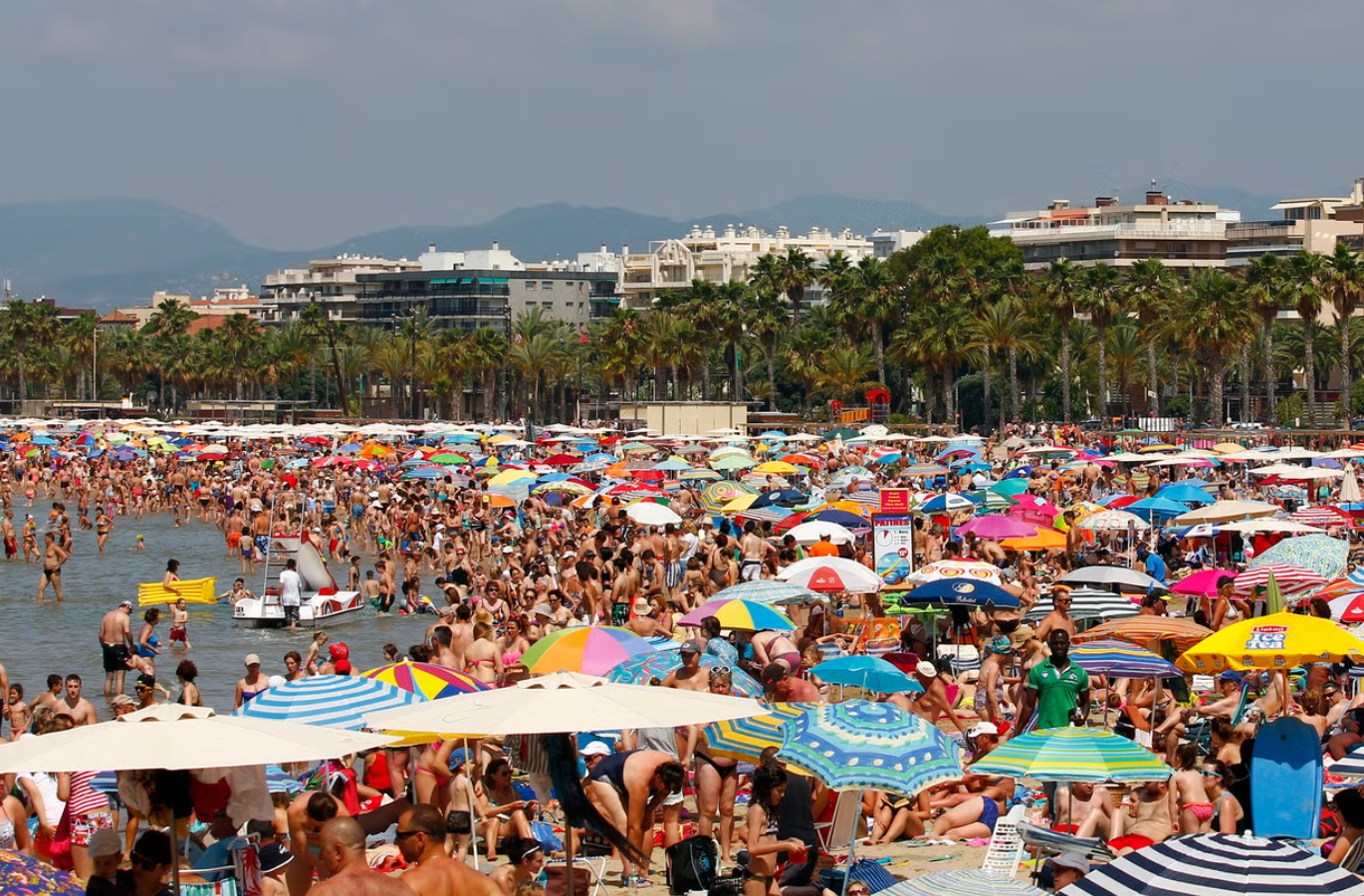
The Statistical Surge: A Tsunami of Tourists
Preliminary figures for the peak summer months (June through September) indicate that Spain welcomed an unprecedented number of foreign visitors, far surpassing the previous record set in 2023. Reports suggest an increase of approximately 12-15% in arrivals compared to the year before, with spending per tourist also seeing a healthy rise. Coastal hubs like the Balearic Islands and the popular cities of Barcelona and Madrid felt the brunt of the surge, with hotels running at near-100% occupancy and key attractions registering record daily foot traffic.
This boom is a testament to Spain's enduring global appeal, fueled by robust post-pandemic travel sentiment, favourable exchange rates, and effective international marketing. Yet, it simultaneously highlights the ineffectiveness of the recently implemented measures designed specifically to dial back the volume.
The Policy Response: A Whisper Against a Roar
In late 2024 and early 2025, Spanish regional governments—under pressure from mounting resident protests over housing shortages and environmental stress—rolled out several high-profile anti-overtourism policies. These measures were intended to shift the focus from volume to value and improve the quality of life for permanent residents.
The key measures introduced included:
Tourist Tax Hikes: In regions like Catalonia and the Balearics, the sustainable tourism tax was significantly increased, particularly for short stays and cruise passengers.
Short-Term Rental Restrictions: Major cities enforced stricter licensing rules, creating "red zones" where new tourist apartments were banned, or imposing a minimum stay duration to discourage transient visitors.
Cruise Ship Limitations: Ports in Palma de Mallorca and Barcelona established stricter daily limits on the number of cruise ships allowed to dock, aiming to reduce the short, intensive bursts of tourist activity that overwhelm local infrastructure.
Access Fees: Pilot programs were introduced for popular natural sites and remote island beaches, requiring pre-booking and a nominal fee to cap daily attendance.
The intended effect of these policies was clear: to introduce friction, raise the cost of visiting, and favour tourists who stay longer and spend more locally. The actual result, however, suggests the market simply absorbed the new costs without a noticeable reduction in demand.
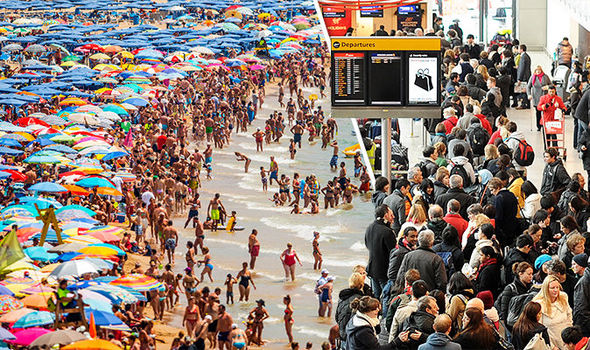
The Expansion: Why the Floodgates Stayed Open
The failure of the 2025 measures to deter visitors is rooted in several powerful economic and psychological factors that government policies failed to account for:
1. The Revenge Travel Phenomenon Persists
Despite being years removed from the initial wave of post-lockdown travel, the global appetite for experiences—often referred to as "revenge travel"—continues to drive tourism. Spain, perceived as a relatively safe, accessible, and high-value European destination, remains the primary choice for millions prioritising a major international trip. A small increase in tourist tax or a slightly higher hotel price is viewed as an insignificant barrier compared to the desire to travel.
2. Global Economic Resilience
Targeted policy measures are only truly effective when the economy is soft. With relatively strong consumer spending in key source markets (UK, Germany, France, and the US), tourists can easily afford the marginal price increases. The cost of an entire holiday in Spain remains highly competitive compared to alternatives like Italy or the South of France.
3. Destination Diversification and Appeal
While the core measures focused on urban hubs and major islands, Spain's tourism appeal is vast. The surge was not just concentrated in Madrid and the Costa del Sol; increasingly, regions like Galicia, Asturias, and Castilla-La Mancha saw significant growth. This widespread popularity means that local measures in traditional hotspots can be easily bypassed by tourists seeking new, equally appealing Spanish destinations.
4. Policies Aimed at Management, Not Reduction
A critical analysis suggests that the implemented measures were too gentle. They were designed to manage the impact of tourism (by using the tax revenue for better services) rather than fundamentally reduce the number of visitors. To truly curb a 15% year-on-year rise, structural limits—such as strict, enforceable caps on new hotel licenses or a complete cessation of certain short-term rental categories—would be required.
A Policy Reckoning: The Future of Spanish Tourism
The record-breaking summer of 2025 serves as a clear warning to Spanish policymakers: the current suite of overtourism measures is insufficient to manage the current level of global demand.
As resident frustration continues to mount, particularly in areas where locals are being priced out of housing, the government faces an inevitable reckoning. Future debates will likely move away from incremental taxes and toward more radical, structural solutions. Potential future actions could include:
- Moratoriums on Development: Total, multi-year freezes on new tourist accommodation construction in high-density areas.
- Zoning Overhauls: Redefining residential zones to explicitly exclude short-term rental activity across entire municipalities.
- Environmental Levies: Introducing significant fees on high-impact activities, such as high-emission air and sea travel, to fund crucial environmental infrastructure upgrades.
Spain’s dilemma is clear: how to reconcile the massive economic benefit of tourism—which accounts for over 12% of its GDP—with the social and environmental sustainability of its most beautiful destinations. The shattered records of 2025 confirm that achieving that balance will require aggressive policies in the years to come.
 5
Like
Published at 9:57 PM Comments (0)
5
Like
Published at 9:57 PM Comments (0)
Record number of Americans move to Spain
Friday, September 26, 2025
Driven by a search for a better quality of life and new visa opportunities, a record number of Americans are choosing Spain as their new home. New Eurostat data shows Spain issued the most first-time residency permits to U.S. citizens in the EU in 2024, an unprecedented number that more than doubles the figure from 2015. For many, the decision is fueled by a desire to escape political fatigue and the high cost of living in the U.S.
According to Spain’s National Statistics Institute (INE), the number of U.S. citizens living in Spain reached 50,623 as of January 1, 2024—a 26% increase in just two years. Data shows the surge is not primarily driven by retirees but by a younger demographic, with a significant number in the 20 to 39 age bracket, many of whom are utilising the country's Digital Nomad Visa.

The lure of lifestyle and affordability
For many Americans, Spain offers a compelling antidote to the pressures of modern life in the United States. Expats report a more relaxed pace, a welcoming Mediterranean climate, and a significantly lower cost of living. A strong U.S. dollar against the euro has increased purchasing power, making real estate more accessible to American buyers.
Real Estate Boom: U.S. property purchases in Spain increased by 57% year-over-year in the first quarter of 2025, with Americans becoming the fastest-growing foreign buyer group.
Cost of Living: Many expats find that daily expenses in Spain are approximately 30% lower than in the U.S., including more affordable housing and fresher, less expensive food.
Political Fatigue: For some, the decision is a direct response to political polarisation in the United States, which gained momentum following the 2024 presidential election.
Digital Nomads and new residency pathways
The recent surge was significantly influenced by Spain's introduction of a Digital Nomad Visa, which streamlines the residency process for remote workers. While Spain officially ended its Golden Visa program for property investors in April 2025, other pathways, including the non-lucrative visa for those with passive income, have continued to attract long-term residents.
This new wave of expats is also spreading out geographically, settling beyond traditional hubs. While Madrid and Barcelona remain popular, other cities like Valencia and Málaga have become major draws for remote workers and those seeking a more authentic Spanish experience.
The economic and social impact
The influx of high-earning Americans, especially remote workers and investors, brings new purchasing power to the Spanish economy. However, this trend also fuels concerns about the potential for rising real estate prices and inflationary pressures in popular areas, a concern voiced by some Spanish citizens. Despite this, the economic injection and cultural exchange are widely seen as a boon for the country.
Looking ahead
The data indicate that this trend is likely to continue. With a strong U.S. dollar, supportive visa policies, and a culture that appeals to those seeking a better work-life balance, Spain remains a top destination. As more Americans discover the benefits of life on the Iberian Peninsula, the cultural and economic exchange between the two nations is set to grow even stronger.
 2
Like
Published at 9:35 PM Comments (1)
2
Like
Published at 9:35 PM Comments (1)
Summer 2025 Ranks Among Spain’s Hottest Ever After Historic August Heatwave
Saturday, September 6, 2025
Spain’s summer of 2025 has cemented its place in the history books, ranking as one of the two hottest on record, nearly matching the historic summer of 2022. This extreme heat has been driven by extended periods of high temperatures, which have intensified wildfire risks and posed significant threats to public health across the country.
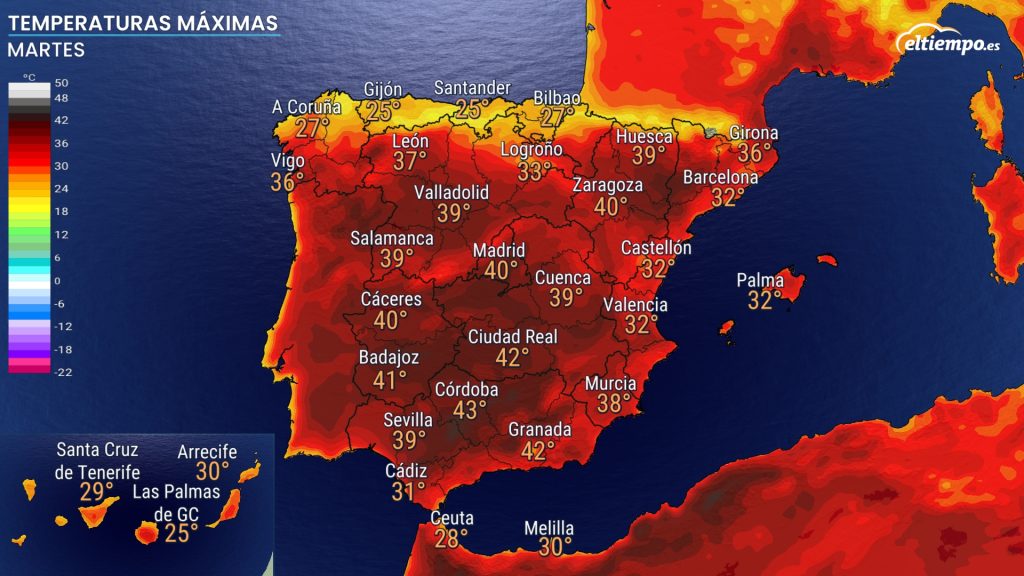
According to Spain's national meteorological agency, AEMET, the summer’s defining feature was a historic August heatwave that set a new record for intensity. With a temperature anomaly of 4.6°C, this event surpassed the previous record set in July 2022. The heatwave lasted 16 days, making the period from August 1st to 20th the warmest of its kind in Spain since at least 1961. The ten-day stretch from August 8th to 17th was the hottest ever recorded in the country.
The persistent heat has made 2025 the second-warmest year on record from January to August, trailing only 2024. This marks a concerning trend, as the last four years have all ranked among the hottest ever recorded, clearly surpassing previous historical benchmarks. While March was notably cold and May was near average, all other months of the year have been classified as warm, very warm, or extremely warm.
The Rising Threat of Climate Change
The trend of increasingly frequent and intense heatwaves is a direct consequence of climate change. AEMET data shows that the average temperature in Spain has risen by 1.69°C between 1961 and 2024. Scientific evidence confirms that heatwaves are becoming longer, more widespread, and more severe. While Spain has always experienced hot summers, recent years have seen an alarming increase in both daytime and nighttime temperatures.
The most intense heatwaves are becoming more frequent. The fact that five of the 20 warmest periods on record occurred during the recent August heatwave, and 15 have happened since 2022, underscores this trend. AEMET emphasised on social media that "The persistence of extreme heat intensifies its adversity," noting the severe impact on vulnerable populations and the escalating danger of wildfires.
A Glimpse into the Future
Climate projections suggest that by the middle of the 21st century, typical summers in the Mediterranean region could be approximately 2°C warmer than they were between 1981 and 2020. Alarmingly, the summers of 2022 and 2025 are already comparable to these mid-century conditions.
The data is undeniable: four of the five most intense heatwaves in Spain have occurred since 2019. This is not a coincidence but a clear indication of a long-term trend towards more extreme summers. While not every summer will be hotter than the last, the overall trajectory is clear and undeniable. This reality highlights the urgent need for both adaptation to and mitigation of climate change.
 2
Like
Published at 7:01 AM Comments (0)
2
Like
Published at 7:01 AM Comments (0)
New Poll Reveals Majority in EU and UK Favour Rejoining, But with Incompatible Conditions
Friday, August 1, 2025
A recent YouGov poll has shed light on public opinion regarding the UK potentially rejoining the European Union, revealing a complex picture of conditional support both in the UK and across the continent.

The poll, conducted in six Western European nations, found that a clear majority of people in the EU's four largest member states—Germany, Spain, France, and Italy—would welcome the UK back into the bloc. Support for a UK return was as follows:
Germany at 63%
Spain at 60%
France at 53%
Italy at 51%.
However, this support is not without conditions. When asked if the UK should be allowed to rejoin while keeping its previous opt-outs, such as remaining outside the euro and the Schengen passport-free zone, the numbers shifted dramatically. In the four largest EU countries, barely one-fifth of respondents (ranging from 19% in Italy and France to 22% in Germany) felt the UK should be allowed to return on those terms. A majority, between 58% and 62%, believe that the UK must participate in all of the EU's main policy areas.
The survey also highlighted a similar divide within the UK. While 54% of Britons now support rejoining the EU, this support is also conditional. The number drops to just 36% if rejoining means giving up the UK's previous opt-outs. This reveals a "public opinion impasse" where both sides want rejoining on their own terms, which are currently incompatible.
The results indicate a growing sentiment in favour of closer ties, but the details of what that would look like remain a significant hurdle. The poll also found that while a majority of Britons now see Brexit as a failure, there is still a divide on whether rejoining is the right priority for the government at this time.
 0
Like
Published at 8:54 PM Comments (5)
0
Like
Published at 8:54 PM Comments (5)
Planning a Trip to Spain? Stay Informed with the Latest Rules and Regulations for 2025
Wednesday, March 12, 2025
Spain, with its alluring climate, extensive coastline, and world-renowned cuisine, remains a magnet for travellers worldwide. In 2024 alone, this vibrant country welcomed an unprecedented 94 million visitors. However, with this surge, Spain faces the challenges of managing overcrowding and mitigating the impact on local life. To address these concerns, Spain has introduced a series of new regulations for 2025. Here’s a comprehensive guide to navigating these changes while ensuring a seamless travel experience.

Entry Requirements: What You Need to Know
The procedures for entering Spain vary based on your country of origin, travel duration, and the purpose of your visit.
For citizens from the European Union, European Economic Area, or Schengen Area, the process remains straightforward. A valid national ID card or passport suffices, with no restrictions on the length of stay unless you plan to remain for over 90 days. In such cases, you must register with local authorities.
Non-EU travellers will encounter stricter border controls in 2025. Ensure your passport is valid for at least three months beyond your departure date. Additionally, you may need to show the following documents:
- Proof of travel insurance
- Return or onward travel ticket
- Sufficient funds for your stay
- Proof of accommodation or a 'carta de invitación' if residing with friends or family
Looking ahead, the European Travel Information and Authorisation System (ETIAS) will be implemented in mid-2025. This system requires a €7 travel authorisation, valid for three years, which can be obtained online.
Changes in Accommodation Regulations
Starting January 2025, Spain has revamped its rules for short-term rentals. Property owners must now register in a national database and obtain a permit before listing properties on platforms like Airbnb. Moreover, they are required to gather sensitive information from guests, including bank details and personal identifiers. There’s also a proposed VAT increase on short-term rentals, aligning it with the 10% applied to hotels, potentially driving up accommodation costs.
While these rules primarily target new rentals, existing hotels and registered Airbnbs remain available. However, limited new rental properties might lead to inflated prices in the future as demand continues to grow.
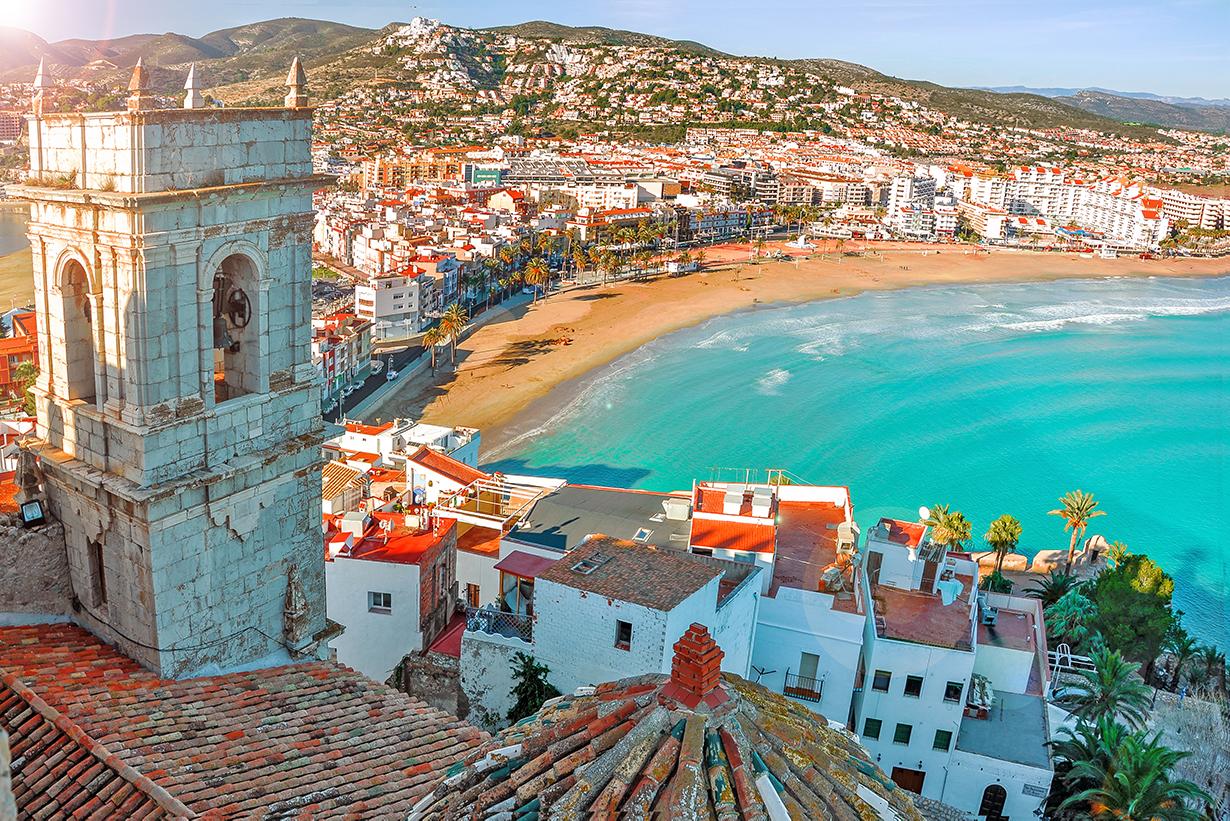
Restrictions on Airbnb Rentals
Airbnb rentals aren’t banned nationwide but are restricted in specific areas. For instance, in Malaga, new rental apartments are prohibited in 43 neighbourhoods where rentals already exceed 8% of the housing stock. Barcelona, taking a more stringent approach, plans to shut down all 10,000 currently licensed short-term rental apartments by 2028, refusing license renewals and new applications.
Tourist Taxes: What You Should Expect
Since 2012, certain regions in Spain have imposed tourist taxes, and these have seen significant hikes for 2025. Barcelona, in particular, has doubled its tourist tax rates. Luxury hotel guests will now pay €7 per night, while those staying in four-star hotels will be charged €3.40. Cruise passengers, even those visiting for a day, will face a €6 fee – a significant increase from previous rates. Additionally, Barcelona may double its municipal surcharge, leading to a possible total of €15 per night, excluding VAT, for luxury hotels.
The Balearic Islands, including Mallorca, Ibiza, and Menorca, have also raised their peak season tourist tax to €6 per night for the most luxurious stays. Similar measures are under consideration in the Canary Islands, with the town of Mogan already implementing a €0.15 per person daily charge.
Other cities like Santiago de Compostela and Toledo are introducing new tourist taxes ranging from €1 to €2.50 per night.
Addressing Unruly Behaviour with Fines
Spain has introduced various local regulations to curb tourist misbehaviour:
Alcohol Restrictions in Barcelona and the Balearics:
Barcelona has expanded its ban on pub crawls to include the Eixample district from June 2025, augmenting the restrictions already in place in the Ciutat Vella district. The Balearic Islands have imposed strict alcohol consumption limits in major resorts such as Llucmajor, Palma, Calvia (Magaluf), and San Antonio in Ibiza. Violations could result in fines from €750 to €3,000.
Driving Restrictions in Mallorca:
In efforts to preserve local communities, Soller on Mallorca has introduced a low emission zone encompassing 12 historic streets. Only vehicles registered to residents can access these areas. Tourists must park in designated zones on the outskirts.
Beach Rules in Torrox:
Torrox, located on the Costa del Sol, has banned beach tents, gazebos, and similar structures. This measure is aimed at improving safety and ensuring lifeguards and emergency services can operate without obstruction.
Smoking Bans:
Spain continues its stringent stance on smoking. Notable bans include smoking on Barcelona’s beaches and over 100 other beaches across the country. The Balearic Islands alone have introduced smoking restrictions on 28 beaches.
Preparing for a Successful Trip
Given these new rules and regulations, it is important to be well-prepared for your visit to Spain in 2025. Here are some tips and reminders to make your experience smooth and enjoyable:
-
Documentation: Ensure you have all the necessary travel documents, including your passport, travel insurance, return tickets, and proof of accommodation.
-
Accommodation: Book early to secure registered hotels or Airbnbs. Be aware of potential price increases due to new regulations.
-
Budget: Factor in tourist taxes and possible fines for non-compliance with local rules.
-
Stay Informed: Keep abreast of the latest travel advisories and local regulations.
While the new rules might seem daunting, they are designed to balance the influx of tourists with the wellbeing of local communities. By staying informed and respecting these regulations, you can have a memorable and trouble-free holiday in Spain. Safe travels!
 0
Like
Published at 11:08 AM Comments (2)
0
Like
Published at 11:08 AM Comments (2)
Spain's New 2025 Tax Agenda: Understanding the Implications
Saturday, January 18, 2025
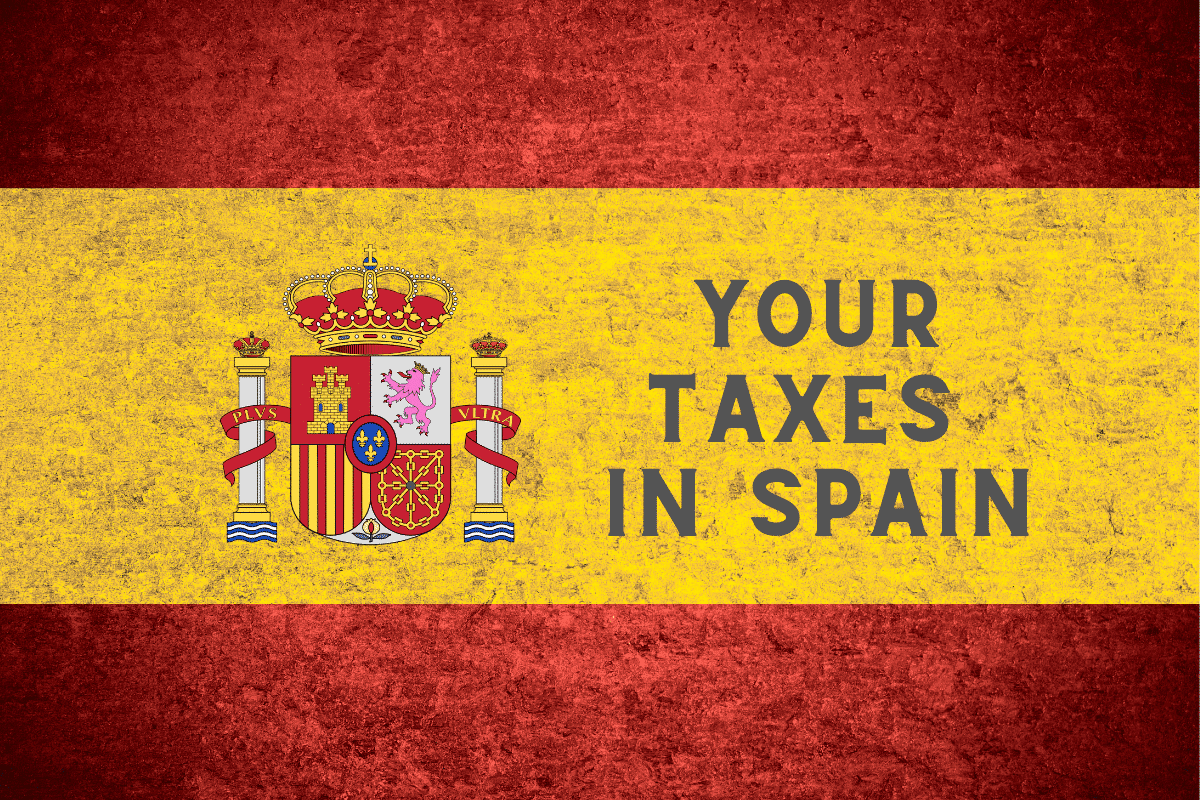
As we step into 2025, Spain ushers in notable transformations within its tax landscape. These adjustments, spanning various sectors and affecting diverse demographic groups, stem from fiscal policies agreed upon during the recent sessions of the Congress of Deputies. With an overarching aim to bolster state revenues by approximately €4.5 billion annually, these changes illustrate the government's strategic move to ensure a robust economic framework. Amidst these changes, some tax relief measures, previously introduced to combat inflation, have now expired. As these developments take shape, a comprehensive understanding is essential for individuals and businesses alike.
Reverting to Standard Rates
A significant change that has captured public attention involves the reimplementation of standard tax rates on previously exempted goods. After many years of enjoying reduced VAT on basic necessities, Spaniards are now witnessing a return to the usual 4% VAT rate on essential food items, including the much-revered olive oil. Alongside this, the temporary reduction in electricity VAT has been rescinded, restoring the rate to its original 21%. These modifications, while boosting revenue, inevitably lead to a rise in household expenses for Spanish families.
These changes reflect a broader economic strategy designed to ensure a sustainable fiscal future as Spain gradually phases out measures implemented to cushion households from past inflationary pressures. Since 2020, public coffers have absorbed extensive cuts, amounting to €120 billion in tax breaks and subsidies. While their removal might indicate a controlled inflation environment, they simultaneously challenge lower-income families' financial stability.
Impact on the Corporate Sphere
Corporate entities, particularly large multinationals and banks, encounter significant revisions in their tax obligations. Marked by changes drafted to align with international benchmarks and outcomes agreed upon with Brussels, these reforms present a nuanced picture for businesses operating in Spain.
Corporate Tax Adjustments
For large businesses and multinationals with turnovers exceeding €750 million, 2025 heralds a minimum 15% corporate tax rate. This aligns with the global effort to ensure that large corporations contribute an equitable share, regardless of where they generate income. However, there is some respite for small and medium-sized enterprises (SMEs); was responded to calls for economic support through a reduction in their Corporate Tax liabilities. For SMEs, a relief package encompassing a €700 million reduction epitomises an essential gesture towards supporting business growth within this critical sector.
The Financial Sector's New Reality
Banks in Spain face a transformative fiscal landscape in 2025. A freshly introduced tax on the financial sector targets interest margins and fees, announced with a progressive tax scale ranging from 1% to 7%. The government estimates that this measure will cumulatively generate €1.7 billion annually over the next three years. The revenue procured under this tax will be distributed among the autonomous communities, corresponding to their GDP—an approach aimed at fostering fair distribution.
Moreover, the tax reform package introduced further considerations. If acquisition operations like BBVA's takeover of Sabadell proceed, additional tax burdens may arise, amplifying the financial sector’s contribution to the economy and the national treasury.
Addressing Fiscal Fraud and Modifying Tax Policies
Among the new measures, the government has committed to tightening regulations to combat fiscal fraud, particularly within the hydrocarbons sector. A revised hydrocarbons VAT aims to prevent manipulation and ensure transparency in operations related to major oil companies. Simultaneously, the modifications within Corporation Tax strive to limit past deductions, bringing Spain's effective tax rate closer to its statutory requirements.
Effects on Personal Income
Throughout these fiscal revisions, certain personal income categories come under scrutiny. Specifically, individuals receiving capital incomes exceeding €300,000 will face an increment in their Personal Income Tax by an additional two percentage points, setting the rate at 30%. Despite these changes, many Spaniards still bear the financial burden resulting from non-indexed tax brackets, which do not reflect inflationary movements.
A report from the Bank of Spain flagged this issue, noting that the absence of indexation has enabled the Tax Agency to collect an additional €11 billion in recent years. As inflation continues to affect household budgets, calls for adjustments persist.
Tobacco, Diesel, and Energy: A Changing Landscape
The beginning of 2025 marks increased taxation on tobacco and introduces a new tax on electronic cigarettes, part of the government’s broader vision to curb smoking across all age groups, especially among youth. This policy extends beyond revenue generation, reflecting a public health focus as the prevalence of tobacco consumption rises.
For motorists, potential changes loom with regards to the hydrocarbon tax on diesel. While current discount measures are slated for removal, political dynamics have temporarily delayed these adjustments. The proposal faces opposition from Podemos, thereby temporarily blocking its legislative passage despite Spanish commitment to Brussels to implement this change as a condition for receiving European funds.
A Record Year with Regional Disparities
As Spain concluded 2024 with revenue close to €300 billion, disparities among the regions regarding local and state taxes remain evident. Regions like Catalonia, previously leading in local taxes with minimal tax breaks, continue to hold significant contrasts compared to Madrid, recognised for its reduced tax burden. These differences highlight the asynchronous fiscal experiences faced by citizens across the country.
Despite achieving record revenue, Spain’s average tax pressure remains below the EU average, reported at 37% of GDP according to Eurostat’s latest figures. This analysis, which considers income levels and contributions after deductions, situates Spain below neighbouring countries like Portugal, Germany, and Italy, with France leading at 45.6%.
Concluding Thoughts
As Spain navigates these new fiscal waters, the array of changes encompasses a vision aimed at stabilising the economy, achieving equitable taxation, and ensuring aligned growth. While these taxes undeniably tighten some financial strain on individuals and businesses, especially amidst global economic uncertainties, they represent decisive movements to achieve balanced public finances. Ultimately, understanding and navigating these transformative changes will be essential for all stakeholders involved as they contribute to shaping Spain’s economic narrative this year and beyond.
 1
Like
Published at 8:21 AM Comments (1)
1
Like
Published at 8:21 AM Comments (1)
CSIC clears up most-common food myths
Saturday, November 23, 2024
SPAIN'S National Research Council (CSIC) has announced a new book series seeking to debunk widely-held myths through scientific answers – including whether bread really makes you put on weight.

Is the crumb or the crust of bread most fattening? The CSIC answers this and other food questions in its latest guide (photo: Pixnio)
The latest edition in the series ¿Qué sabemos de...? ('What do we know about...?') is titled Los bulos de la nutrición ('Hoaxes about nutrition'), co-authored by researcher Miguel Herrero.
One of the most-asked questions about diet, Herrero reveals, is which part of bread is the most fattening – the crumb or the crust.
“Given that it has less water in it, the flour parts – basically, carbohydrates – are more concentrated in the crust,” the scientist explains.
“For this reason, if you take the same weight of the crust and the crumb, it's the crust that contains more calories.”
Another common grey area about nutrition involves food items described as 'anti-oxidants', which are said to flush out unwanted substances known as 'free radicals' from the body, reducing the likelihood of illness through preventing premature cell ageing and fighting infection.
“There's not enough scientific evidence on the true rôle of anti-oxidants in diet, in terms of their illness prevention effects,” Herrero cautions.
This said, “there are some indirect signs that makes you think they could have a positive effect – although we don't know to what extent – and more and more studies are being carried out into how anti-oxidants in food are metabolised in humans.
“These will help shed more light on the subject.”
But this hitherto lack of robust evidence is no reason to stop eating blueberries and drinking green tea - “food and drink containing anti-oxidants will not do you any harm,” Herrero clarifies.
“What's not really justified is that these salads, juices and smoothies marketed as 'anti-oxidant' are more expensive, based upon that claim alone – all the ingredients naturally contain anti-oxidants anyway.”
Herrero, additionally, addressed concerns about additives in food – those used to preserve them for longer, or alter their taste, scent and colour.
“Despite their bad press, these additives play a crucial part and they're safe for consumption,” Herrero assures.
“There are food groups like honey, oils, butter, or pasta, for which the use of additives is banned or legally limited, but there are others such as wine, and pre-cooked beans and pulses in tins, where additives are necessary.”
The new book on 'dietary hoaxes' covers how to interpret the labels on food items, containing nutritional information – including the full list of ingredients, which has been obligatory in Spain by law since 2016.
Read more at thinkSPAIN.com
 0
Like
Published at 1:24 PM Comments (0)
0
Like
Published at 1:24 PM Comments (0)
How to help residents affected by the recent floods
Saturday, November 9, 2024
VARIOUS charities and organisations – local and national – have set up channels for members of the public to help those affected by the storms and flash floods in the province of Valencia.
 Valencia regional Red Cross workers delivering aid parcels during a previous campaign (photo: @CruzRojaCV on X.com)
Valencia regional Red Cross workers delivering aid parcels during a previous campaign (photo: @CruzRojaCV on X.com)
As well as collecting funds, these organisms are seeking food, clothing, bottled water, and other essentials for residents mainly to the south and west of the city of Valencia.
The Red Cross (Cruz Roja) has set up a website for direct cash donations – https://cercadeti.cruzroja.es/ayudaafectadosinundacionesdana – which can also be made by emailing the charity at donativos@cruzroja.es, calling the toll-free number 900 10 49 71, sending a text message to 28092 with the word AYUDA ('help'), or a Bizum to the number 33512.
You may be asked for your Spanish national identity number – DNI for Spanish nationals, or NIE for foreign residents – but those who do not live in Spain can still donate to the Red Cross to help the flood victims.
They can make a bank transfer to the Red Cross account – ES44 0049 0001 5321 1002 2225.
The Red Cross says it is 'prioritising cash donations' at present, since its volunteers and salaried workers on the ground are best place to determine which services those affected need, given that these needs are constantly changing.
Church-based charity Cáritas, which had branches in almost every town in Spain and habitually operates food banks and poverty relief, is also collecting for flood survivors – the organisation says donations can be made via Bizum to 00089, by calling the freephone number 900 33 99 99, or via its dedicated website https://www.caritas.es/emergencias/graves-inundaciones/.
The Comunidad Valenciana regional government, via its treasury office and in partnership with Sabadell bank, has set up an account for donations, of which 100% will go directly to affected residents.
Transfers can be made to the IBAN number ES94 0081 0693 6100 0242 3445.
Banco Sabadell, where the account is based, has pledged to match donations euro for euro, in addition to promising a minimum of half a million euros on top of any funds accrued.
If you are based in the Comunidad Valenciana or in Madrid, your local council is likely to have set up collection points for you to provide tangible goods such as clothing, toiletries, non-perishable food, bottled water and, in many cases, food and other necessities for pets – both those belonging to flood victims, and those at animal shelters cut off by the rising rivers.
One of these collection points is at Valencia FC football stadium, the Mestalla arena on the Avenida de Suecia in the Pla del Real square.
The Madrid-region commuter town of Leganés has set up a collection point in the Local Police and Civil Protection headquarters on the C/ Chile, and has been transporting lorryloads to the affected areas of the province of Valencia.
Leganés town hall says it is collecting non-perishable food, bottled water, clothing and other personal essentials, blankets and towels, as well as buckets and spades to help with the mass clean-up operations.
Toledo (Castilla-La Mancha) to the south of Madrid has asked for similar essential items to be dropped off at a help point at number 4 of the C/ Talavera de la Reina.
Many towns in the Comunidad Valenciana have set up blood donor sessions to help those who have suffered serious injury and illness as a result of the flood.
Eligibility criteria for giving blood can be discussed with the organisers, but usually includes being in generally good physical health, weighing not less than 50 kilos (7st 12lb, or 110lb), being aged at least 18, and not being on certain types of medication.
Animal shelters need foster families, food and volunteers
Animal shelters are also calling for help – Modepran in Valencia's Campanar neighbourhood, on the C/ Nou de Paterna, is asking for 'urgent' foster parents for cats and dogs whose habitual accommodation has been washed away, as well as donations via its account at Banco Sabadell – ES94 2100 1716 8601 0050 3303 – and, for those able to travel to the centre in person, blankets, towels, leads and collars.
Read more at thinkSPAIN.com
 1
Like
Published at 10:07 AM Comments (0)
1
Like
Published at 10:07 AM Comments (0)
Spam post or Abuse? Please let us know
|
|